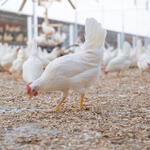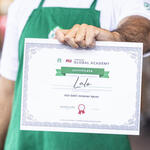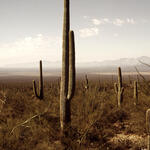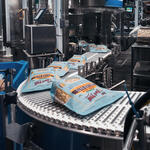- Date: 06 April 2023
- Author: Lindsay Petelinkar, Senior Corporate Sustainability Analyst for Lowe’s
Taking a moment to stop and reflect on my career journey has been uplifting. How did I get here?
As a Senior Corporate Sustainability Analyst for Lowe’s, the majority of my daily focus pertains to forestry and responsible wood sourcing. Within my role, I am also able to work collaboratively on other sustainability-focused projects. This job is a dream come true for me as a passionate environmentalist and it’s also an incredible learning opportunity for an early-career professional. In my role, I’m able to harness my passion for the environment to execute projects that support our mission to help Lowe’s customers live more sustainably at home and that inspire tangible change in a corporate setting.
- Date: 20 March 2023
- Author: Sheila Bonini, Senior Vice President, Private Sector Engagement
It’s not a shocking revelation to say that water is the lifeblood of business. We know that every industry—indeed every company, organization, and person on Earth—needs clean and ample freshwater to survive. It’s such an obvious fact that we take it for granted and forget. For many of us, it’s difficult and frightening to even imagine a world in which we no longer have access to the water we need. Maybe this is why water stewardship never seems to get the attention it deserves. But we no longer have that luxury.
This week, the United Nations hosts the 2023 Water Conference, the first in nearly 50 years. All of us at WWF are thrilled to see water take center stage in a global platform. And I’m personally so excited to see the enthusiastic engagement, participation, and support from so many of the world’s leading companies. The reason for this goes beyond an altruistic notion to save the planet—though of course we admire and encourage that; it’s about making sure their business stays in business.
- Date: 09 March 2023
- Author: Katherine Devine, WWF and Sandra Vijn, Kipster
WWF has written previously about turning food waste into animal feed, finding that 14.7 million tons in the US could be safely used for animal feed rather than go to landfills. A new WWF paper highlighting Netherlands-based egg company Kipster’s US expansion goes a step further, arguing that we should consider relabeling “food waste” to “surplus food.”
- Date: 02 March 2023
For our Rising Stars series, we're featuring the next generation of leaders who are working toward a more sustainable world. We recently spoke with Ashley Kuhn, Senior Director, Nature & Biodiversity at Procter & Gamble to learn about her role, what she finds most challenging and rewarding, and her advice for those new to the field.
- Date: 01 March 2023
- Author: Jenna Bailey and Cheron Carlson, WWF
Are you ready to become a sustainability changemaker?
In partnership with WWF and Intersectional Environmentalist, Starbucks is launching an updated sustainability course, Greener Apron, on the company’s open-source platform, Starbucks Global Academy.
Greener Apron gives Starbucks partners (employees) and anyone wanting to learn more the information and tools they need to learn about sustainability, leveraging examples from Starbucks’ sustainability initiatives, and how they can make small changes to make a big difference at work and in their communities. The goal of the course is for individuals to be empowered with a personal action plan to move forward in their sustainability journey.
- Date: 28 February 2023
Our oceans provide a range of goods and services, many of which depend on healthy ecosystems.
Global seafood production supports the livelihoods of more than 600 million people, and serves as the primary source of animal protein for approximately 3 billion people. Yet with only about 30 percent of the seafood sold today certified or rated as sustainable, and with more than 30 percent of the world’s fisheries currently over-exploited, unsustainable seafood production poses an immense threat – both to the ecological health of our oceans and to the socio-economic health of the people and companies that depend on them.
- Date: 27 February 2023
Water is a vital element of life and one of the world’s most precious resources. However, with risks such as climate change, population growth, and changing consumption patterns, water is under threat. In fact, freshwater species are declining by 83%, faster than terrestrial or marine species. Humans are also at risk, with 1.1 billion people worldwide lacking access to water. By 2025, two-thirds of the world’s population may face water shortages.
Building resilient communities and ecosystems is a crucial step in the fight against the water crisis and climate change, something that the WWF and The Coca-Cola Company partnership is working toward. Across the world, the partnership has identified priority freshwater basins and collaborated with governments, local communities, and other businesses to ensure the long-term protection and sustainable management of freshwater resources. Coca-Cola’s charitable arm, The Coca-Cola Foundation, has also supported work in this area.
One example of this can be found in the partnership’s work along the Yangtze River in China.
- Date: 16 February 2023
- Author: Katherine Devine and Emily Moberg, WWF Markets Institute
The news is full of headlines about companies making commitments to reduce their greenhouse gas (GHG) emissions. Given the alarming pace of climate change and governments’ failure to slow it, companies’ contributions are vital to both the planet and their bottom lines. Companies have a stake in mitigation efforts as climate change presents a real risk to their operations and infrastructure. However, behind all of the ambitious goalsetting and initial progress lies a secret that’s ripe for exploitation: product-level GHG accounting is so fragmented and flexible that it’s incredibly difficult to hold companies and sectors accountable for emissions reductions. What’s more, because companies can choose which methodologies to use and companies in adjacent industries may choose different methodologies (think: beef and leather), some emissions are simply not being accounted for once we get to the end products.
- Date: 09 February 2023
As fans from all over the world head to Arizona this weekend for football’s big event, thousands of sustainability professionals won’t be far behind. Greenbiz23 – an annual event for sustainability leaders – kicks off on Tuesday, February 14. Once again, WWF experts from across the organization will lead discussions, provide insights, and connect with like-minded individuals, looking to achieve sustainability solutions at a scale and speed that matters.
If you’re participating in GreenBiz23, we invite you to join an event or session featuring WWF experts and of course come say “hello” during conference networking breaks. Here’s where you can find us:
- Date: 20 December 2022
If you’re baking this holiday season, you’re likely doing the best you can to make the most of your ingredients and waste less. But it’s not just up to consumers to do their part; minimizing food waste must be a priority throughout the entire supply chain. And some companies are already rising to that challenge.
Bob’s Red Mill partnered with the Pacific Waste Food Waste Commitment, along with TripleWin Advisory, to develop an employee engagement campaign to reduce food waste in their whole grain milling and packaging facility in Milwaukie, Oregon. The details of the campaign and its results are available in a new case study here.
We caught up with Julia Person, Sustainability Manager at Bob’s Red Mill, to discuss lessons from the campaign and how and why the company is working to address food waste.

Julia Person, Sustainability Manager at Bob's Red Mill
Why is addressing food waste a priority for Bob’s Red Mill?
We’re proud to be the first manufacturer to sign onto the Pacific Coast Food Waste Commitment to collaboratively cut food waste in half by 2030, and we hope to lead the way for other companies in the Pacific Northwest. This issue is a priority for two different reasons: we know preventing food waste can help fight climate change and stop hunger, and it also makes our business more efficient and profitable. As an employee-owned company, our profits are shared with the entire team. That’s a powerful incentive for us all to work together to prevent food waste. But it’s also a natural outgrowth of our core values of Respect, Teamwork, Accountability and Determination.









